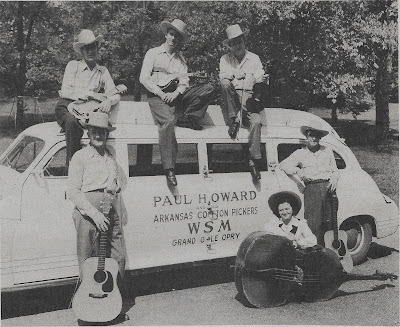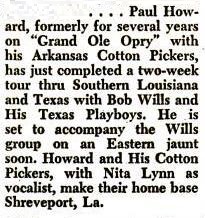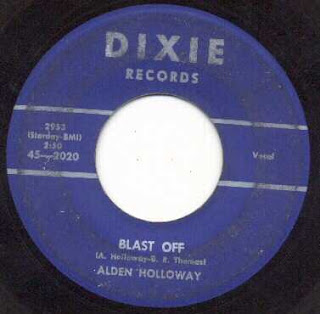 |
| The Dixie Fun Barn Dang at WAGA (Atlanta, Georgia), ca. 1947 with Tommy Trent (next to the microphone on the left) |
Although Tommy Trent was a native Tennessee boy and made various stops during his early career, his biggest impact probably came when he settled in the early 1950s in Little Rock, Arkansas. There, he became one of those all-around music entrepreneurs - operating a record label, a live music venue, and performing in his own right.
Thomas Francis "Tommy" Trent was born March 8, 1924, in Strawberry Plains, Tennessee. He was one of seven children of Dyo M. and Alice C. Trent and came into a musical inclined family. Trent would eventually learn to play guitar as well as bass and found also he had a talent for singing. His father died in 1935, when Trent was still a child.
Trent started his career in 1943 in nearby Knoxville, where he joined Mel Foree's Victory Boys and as part of this group, could be heard on the city's popular radio program "Mid-Day Merry-Go-Round". It was also during this time that Trent made his first experiences in a recording studio as part of Knoxville singer Pappy Gube Beaver's background band (which also included Chet Atkins on fiddle). Beaver recorded for Capitol in Atlanta in 1945. Knoxville was a tinsmith for future country music stars, including such as Chet Atkins, Red Kirk, Bill Carlisle, and Don Gibson, but Trent did not stayed too long there and set out on the road. He spent about three months with Paul Howard's Arkansas Cotton Pickers in 1944, performing on the famed Grand Ole Opry with this group, but soon left again.
By the summer of 1945, he travelled with a tent show and a short time later, he performed with a group known as the Dixe Fun Barn Gang on WPDQ in Jacksonville, Florida. This same group, including Trent, then moved to Atlanta, where they were heard on WAGA from September 1946 until December 1948 and also performed one-nighters in the surrounding areas. They had a show called the "Dixie Fun Barn", which centered around Trent, and was heard several days a week and was one of the most popular country music shows on the station at the time, according to author and Atlanta country music expert Wayne W. Daniel. After leaving WAGA, the group had a rather brief engagement at WQAM in Miami before they would return to Atlanta to perform on WGST for a couple of months (October 1949 until January 1950). During this brief stint, Trent also appear on the station's Georgia Jamboree live show.
 |
| Billboard November 29, 1947 |
During the next two years, Trent founded a new band and managed to land a spot on the famed Louisiana Hayride in Shreveport. Apart from the regular Saturday night broadcasts over KWKH, Trent took also part in the Hayride's tours across the south and appeared alongside such stars as Hank Williams. Along with Tommy Hill and Webb Pierce, he also hosted a nightly DJ program right after the Hayride.
In 1952, Trent and an unknown group of back-up musicians, which might have been his own band, went into KWKH's studio in Shreveport to record two songs: "Paper Boy Boogie" and "Sweetheart I Am Missing You". These recordings were, possibly with the help of record shop owner and talent scout Stan Lewis, released on Chess' subsidiary label Checker Records (#761) in September 1952. Lewis was an important personality in Shreveport's music scene and had placed such acts as Jimmy & Johnny with Chess, so it's eligible to assume this also happened with Trent.
Although Trent's first solo record did not make the national charts, it must have been a promising release as Texas Bill Strength covered "Paper Boy Boogie" for Coral the same year. Trent performed these songs also on his personal appearances and Hayride live recordings of both have survived in the show's archives. Trent was also captured live on the show singing Louis Innis' "No Muss, No Fuss, No Bother".
During his tours, Trent passed through many different places, including Arkansas, and in 1952, finally settled down in the Natural State's capitol, Little Rock. He began hosting a three-hour DJ show on local KTHS, a station that had moved from Hot Springs to Little Rock shorty before, and opened his own Hillbilly Park in the city around 1953. This live music venue, modeled after country music parks in the northeastern states, featured performances by country stars throughout the summer. By 1955, portions of those concerts also aired over KTHS under the name of "Arkansas Hayride". Local talent on these shows included such acts as Shelby Cooper and Gene Davis.
 |
| Billboard September 3, 1955 |
By late 1954, Trent and his band had introduced a show also on KATV, Little Rock's local television station. At that time, the band consisted of Trent on vocals and guitar, comedian Les Willard on vocals and rhythm guitar, Cotton Nixon on fiddle, J. D. Raley (later replaced by Leroy Brannon) on steel guitar, Max Fletcher on bass, Don Taylor on "solos" (as reported by Billboard, whatever that means). A short time later, Trent's brother Coy also joined the group, which was initially known as the Dixie Mountaineers and by April 1955 as the Country Playboys. Apart from performing and doing radio work, Trent also pursued other business interests and opened up a restaurant in May 1955, "Tommy Trent's Chuck Wagon".
Tommy Trent had not recorded since his Shreveport debut session in 1952 but he changed this four years later. With a band that included prominent Arkansas western swing fiddler Kinky King (who alternated between drums and fiddle) and soon-to-be rockabilly pianist Teddy Redell, Trent recorded "It's My Turn to Cry Over You" as well as "Truck Drivers Roll" at the KTHS studio. On the latter, Virginia Brannon took over lead vocals. Brannon was a member of Trent's band and went on to be his wife. Both songs were released in 1956 on the Little Rock based Camark label. This was still pure country music, although by 1956 times had changed, and although Trent was a bit late, he would change his music style on recordings to a more hard-etched sound later on.
In the early 1960s, Trent contiued to record for independent labels. His first record for Dan Mechura's Allstar Records, a label from Houston, Texas, that specialized in country music, was recorded in the spring of 1959 at KTHS and released the same year. The recordings featured his wife Virginia as well as Delores King on harmony vocals, Bill Dixon on lead guitar, possibly Bobby Pearl on steel guitar, Kinky King on fiddle, Teddy Redell on piano, and Mex Fletcher on drums. The results, "Just for Tonite" and "Storm of Love", were released on Allstar #7184. The A side was penned by Vriginia Trent, while the flip was a composition of background singer Delores King.
A second session for Allstar was cut in spring 1960 at KTHS with the same line-up, produced "A Mile to the Mailbox" and "Love Me" (Allstar #7198). The A side was a "medium-beater" (as Billboard put it) rock'n'roller, while its flip was a pure country side. Billboard placed the disc, which appeared around March 1960 in its "medium sales potential" review section and it's likely that it didn't sell better than the magazine predicted.
In 1962, KTHS was sold and became KAAY, which urged Trent to switch to KXLR, also based in Little Rock. Around the same time, he gave up his spot on KATV for a show on KTHV. By then, he had given up his Hillbilly Park in favor of a new live venue, Tommy Trent's Fun Barn, which was located on Pike Avenue in North Little Rock (previously known as "The Juroy"). This place featured regular live performances by local talent as well as top names on Saturday nights and was a popular spot during the 1950s and 1960s. Some of the names that appeared on these shows included locals such as Bobby and his Buddys, sisters Peggy & Patty Kuske, Robert "Bob Holladay, George Lyle & Laura Glenn, Bobbie Holdcraft, among others. The stars who passed through Trent's Fun Barn reads like a who's who of Nashville, including Johnny Cash and June Carter Cash, the Carter Family, Dolly Parton, Waylon Jennings, the Osmons, Tammy Wynette, George Jones, Grandpa Jones, Little Jimmy Dickens, Ferlin Husky, Faron Young, Loretta Lynn, Kitty Wells, Marty Robbins, Jim Ed & Maxine Brown, Conway Twitty, Roy Acuff, String Bean, and probably a lot more.
The Fun Barn live shows as well as Trent's TV shows were very popular in Arkansas. Testimony to that are countless people who remembered the shows fondly: "My mother Clarice Brannon Lawrence and Tommy Trent’s wife Virginia Brannon Trent were cousins and my parents took us kids to the Tommy Trent Fun Barn in North Little Rock, Arkansas, nearly every weekend to hear all the country singers and new talents that would play and sing there," recalled Lavonda Lawrence Roberts. Betty Holbrook remembered: "I remember watching and listening to Tommy Trent sing in the '50s." And Charles Jackson added: "As a small boy in Conway, Arkansas, in the early '50s, our family always listened to Tommy as he deejayed his radio program." These valuable memories came from French collector Xavier Maire, whose blog sadly went offline.
Trent re-recorded one of his aforementioned Allstar songs as "I Walk a Mile (to the Mail Box)" along with "This Week End", released in 1965 on the T Bar T label. T Bar T was likely Trent's own company and I assume the name stood for Trent's initials (T bar T = T-T = Tommy Trent). He also recorded Carolyn Dixon and Olen Bingham for his imprint.
Trent retired from the music business in 1970. He was the president of a Little Rock publishing firm in the 1980s. Tommy Trent died on July 5, 2003, at the age of 79 years in Bryant, Arkansas, a suburb of Little Rock. He was what I call a local music entrepreneur. Memphis had Eddie Bond, Abilene had Slim Willet, and Little Rock had Tommy Trent.
Camark 501 Virginia Brannon / Tommy Trent Band - Truck Drivers Roll / Tommy Trent and Mountain Valley Trio - It's My Turn to Cry Over You (1956)
Allstar 7184: Tommy Trent - Just for Tonight / Storm of Life (1959)
Allstar 7198: Tommy Trent - Love Me / A Mile to the Mailbox (1960)
T Bar T 665T-0962: Tommy Trent - I Walk a Mile (to the Mail Box) / This Week End (1965)






























